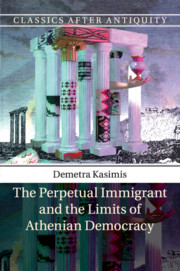Crossref Citations
This Book has been
cited by the following publications. This list is generated based on data provided by Crossref.
Frank, Jill
2019.
Athenian democracy and its critics.
Ethnic and Racial Studies,
Vol. 42,
Issue. 8,
p.
1306.
2019.
Books Received.
The Classical Review,
Vol. 69,
Issue. 1,
p.
341.
Roupa, Vicky
2020.
Articulations of Nature and Politics in Plato and Hegel.
p.
95.
Kasimis, Demetra
2020.
Medea the Refugee.
The Review of Politics,
Vol. 82,
Issue. 3,
p.
393.
Cocks, Joan
2020.
Between nativism and displacement: Citizens, strangers, and surplus status in the contemporary age.
Current Sociology,
Vol. 68,
Issue. 2,
p.
169.
Clackson, James
James, Patrick
McDonald, Katherine
Tagliapietra, Livia
and
Zair, Nicholas
2020.
Migration, Mobility and Language Contact in and around the Ancient Mediterranean.
Parks, Mitchell H.
2021.
Xenophon’s Funeral Oration.
Mnemosyne,
Vol. 76,
Issue. 1,
p.
23.
Clements, Jacquelyn H.
2021.
THE GIFT OF IDENTITY: (RE)PRESENTING AUTOCHTHONY IN CLASSICAL ATHENS.
Ramus,
Vol. 50,
Issue. 1-2,
p.
189.
Kasimis, Demetra
2021.
ELECTRA LOST IN TRANSIT.
Ramus,
Vol. 50,
Issue. 1-2,
p.
11.
Revermann, Martin
2021.
Brecht and Tragedy.
Lape, Susan
2021.
MOBILITY AND SEXUAL LABORERS IN MENANDER'SDIS EXAPATONAND PLAUTUS’BACCHIDES.
Ramus,
Vol. 50,
Issue. 1-2,
p.
25.
NATHAN, CHARLES
2022.
The Urban/Rural Divide in Athenian Political Thought.
American Political Science Review,
Vol. 116,
Issue. 4,
p.
1490.
Abbt, Christine
2022.
Demokratisches Selbstverständnis.
Politisches Denken. Jahrbuch,
Vol. 32,
Issue. 1,
p.
171.
Isayev, Elena
2023.
Representation of Whom? Ancient Moments of Seeking Refuge and Protection.
Humanities,
Vol. 12,
Issue. 2,
p.
23.
Marasco, Robyn
2023.
The Real Possibility of Physical Killing: A Feminist Critique of Carl Schmitt.
American Journal of Political Science,
Vol. 67,
Issue. 4,
p.
1067.
Cecchet, Lucia
2024.
Voiceless, Invisible, and Countless in Ancient Greece.
p.
99.
Wijma, Sara
2024.
Voiceless, Invisible, and Countless in Ancient Greece.
p.
207.





